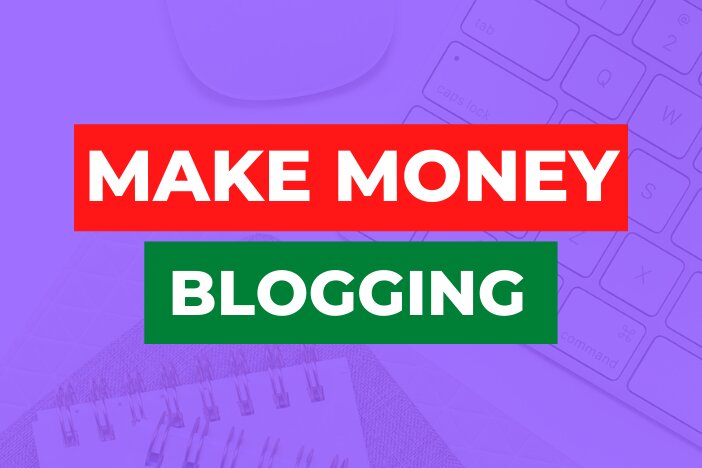One of the hurdles that most newbies face in their journey to make money online is how to make money blogging.
This is mainly due to the ever resounding debate among Probloggers of
“is blogging dead?”
You must abandon the advice you’ve been hearing about if you want to know how to make money blogging.
Write about your interests, remain consistent, develop good writing habits, and produce great content, according to “expert” bloggers.
After that, in a few years, you’ll have just enough website traffic to monetize your website through affiliate programs, online courses, podcasting, Google AdSense, or digital product sales.
The harsh reality is that it doesn’t have to take years; there’s simply a lot of bad advice out there.
You have to start acting like a CEO and designing processes to grow your blog like a business, not a hobby if you want to make life-changing money off your blog as quickly as possible.
The majority of blogging advice is detrimental rather than beneficial.
You’re sold the fantasy of passive income and the opportunity to earn money online while sleeping, despite the fact that 90% of bloggers fail.
Despite this, these “experts” who began blogging over a decade ago are the only ones reaping the benefits of blogging.
If you truly want to make money blogging, the first thing you must realize is that you must concentrate less on writing and more on designing the systems need to grow your blog.
Keep in mind that you’re not just a blogger; you’re also an owner of the business.
First and foremost, these aren’t get-rich-quick schemes. If you’re looking for a fast way to make money online, you’ve come to the wrong destination.
Don’t be fooled by images of flashy cars, mansions, or people working from the beach with a laptop on their lap while facing the sun.
Yeah! I know that you’ve probably come across one of such on the internet before.
Every single one of such is a rip-off, and any programs or training you purchase from them would be a waste of time, effort, and money.
Unlike your regular “make money online” blogs, this is a detailed guide on how to earn money from home using WordPress and blogging.
To get started, most of such strategies necessitate some time and/or financial investment. You will reap the benefits if you are able to put in the effort instead.
You’ll require your own self-hosted WordPress site before you can start using either of the techniques in this post. For newbies, here’s a step-by-step tutorial on how to set up a WordPress blog.
If you’re 18 or 75, the procedure is extremely simple to follow. The best thing is that a lot of people already make money from their websites.
That means you can transform your blog into a money-making machine using tried-and-true approaches that have worked for others.
It’s difficult to find out how they did it with so many bloggers out there, but we are here to guide you through the whole process.
After you’ve set up your blog, you’re then ready to start following this guide.
How To Start A Profitable Blog
Since the topic of discussion is how to make money blogging, it does mean that you would have had your blog up and running.
With that said, I will provide you with a detailed guide on how to start a profitable WordPress blog from scratch even if you are a beginner.
While other blogging platforms exist, WordPress is the best content management service of choice because of its user-friendliness and large user base.
1. Choose a topic
Make sure you know what you’re going to talk about.
The first step to becoming a successful blogger is to choose a niche (topic) in which you are interested and skilled. This is critical if you want to run a successful blog.
Don’t start a news blog because everybody else is doing it. If you’re good at games and have a lot of enthusiasm for them, start a gaming blog.
Start there, no matter what niche you’re good at. You can branch out into other niches once you’ve built yourself.
Define a subject or niche and build the whole content strategy around it.
This will assist you in not only focusing on your writing but also in developing digital resources and products that complement your content.
It is easier to write content when you blog about a niche that you are knowledgeable and passionate about. Since you enjoy it, your motivation level would be high as well.
There is nothing wrong with blogging for a living, but you must ensure that you maintain a healthy balance by providing quality content to your readers.
This will help you to attract customers by luring them in with your insightful posts, then luring them in with a lead magnet before dropping them into your sales funnel, which is basically how to make money blogging.
In conclusion, write about what you enjoy.
2. Select a blogging platform
Though WordPress is by far the most common blogging medium, there are others to consider, including microblogging platforms like Blogger.com, Tumblr, and even Medium.com.
If you’re passionate about blogging, however, you’ll probably want to use a self-hosted WordPress website with a custom domain.
Although you might create a blog on WordPress.com with a subdomain like yourawesomeblog.wordpress.com, a self-hosted solution would give you more exposure and allow you to use subdomains on common sites for content marketing.
3. Pick a domain name
If you’re keen on making money from your blog, you’ll need a custom domain name.
Find a short but valid keyword-rich (if possible) domain name that is reflective of your desired topic, sector or niche rather than depending on a third subdomain.
How can we check if a domain is available?
In this case, I prefer to use Bluehost’s domain name checker. To see what’s open, type each possible name in one at a time.

When you press the “Search” button, you’ll see if the name you want is available.
Continue to try your possible names before you find one you want. Return to the beginning and continue brainstorming if none of the possible names are available as a.com.
To get your domain, go to Namecheap, BlueHost, HostGator, or any other number of domain name providers.
If you’re serious about SEO, you should consider these criteria when choosing your domain name:
- If at all necessary, go with a .com.
- Numbers, hyphens, and homophones (words that sounds the same but are spelled differently) should all be avoided
- Make it as quick and straight to the point as you can.
- It must be easy to pronounce and comprehend.
- Avoid using terms that are difficult to spell or have a high likelihood of being misspelled.
Do you want a completely free domain name? The next steps will show you how to obtain one for no cost.
See Also: What Happens When Domain Expires? – Shocking Truth Revealed
4. Select a good web hosting company like Bluehost
There are lots of fantastic hosting providers available. There are almost limitless choices if you’re launching a WordPress self-hosted blog.
The most crucial part is to do your homework and choose the best option that suits your budget while also ensuring that the service quality and uptime guarantee are met.
You’ll probably want to begin with a Shared Hosting plan and work your way up from there.
If you reach a few thousand daily users, you’ll most likely need a dedicated hosting solution including a CDN.
You’ll need web hosting (where your website resides) and a domain name (your website’s address) to get underway. The best part is that Bluehost, our preferred web hosting provider, provides both as a bundle.
It’s also very cheap. As a webhostbros.com reader, you also get a fantastic discount. In addition, the first year of your domain name is free.
So go to Bluehost and press the “Get Started” button.

Following that, you’ll see four different options. Scroll down and choose the $2.95/month Basic Plan. It has everything you’ll need when you’re just starting out.
If you need to, you can still update later. So, for the time being, go with the Basic Plan.
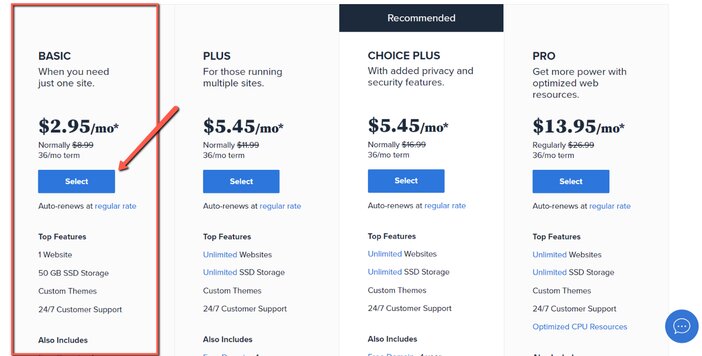
After that, you’ll have the opportunity to register the domain name you discovered in phase three. This step is simple since you already expect it’s available.
Type it into the left-hand box, check that the dropdown is set to .com, and then select “Next”.
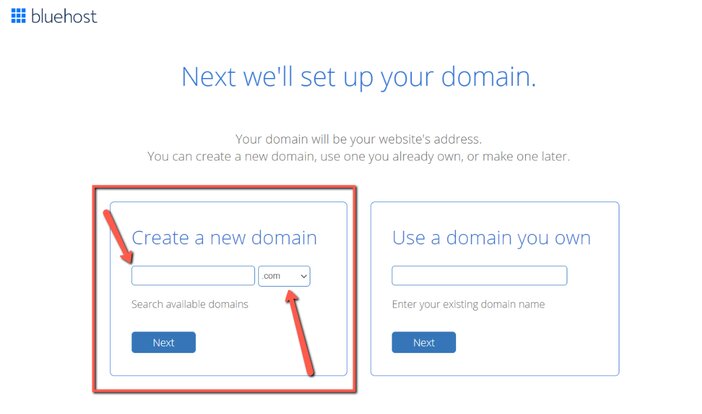
After that, you can either sign in with your Google account or manually enter your details.
Then, under “Package Details,” scroll down and select your registration period from the dropdown menu. With a 36-month subscription, you’ll get the cheapest bargain by locking in a lower rate.
If you’d rather save money right now, you can opt for a 24-month or 12-month plan.
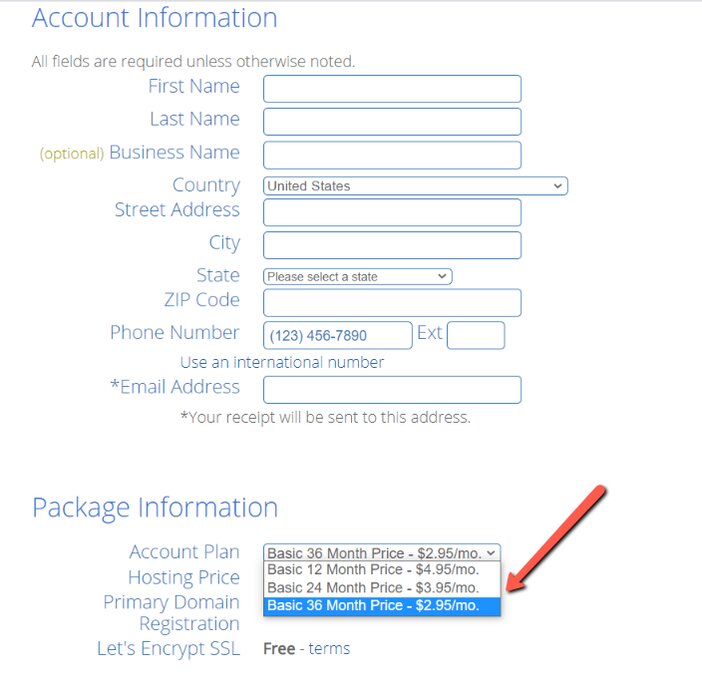
You now have a few more extras to pick from.
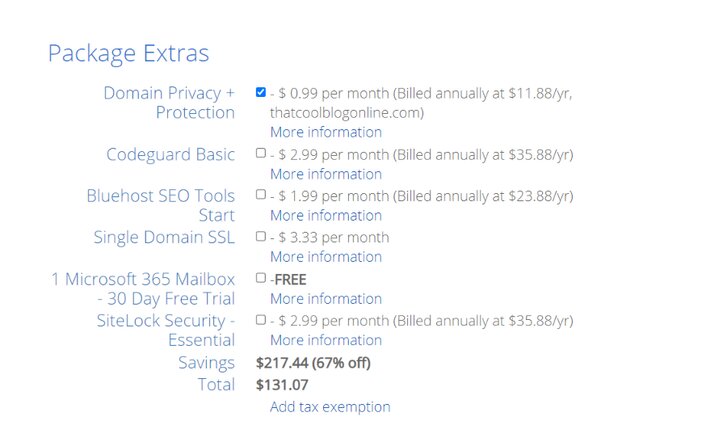
Package Extras – What You Do and Do not Need
Let’s take a look at these kit extras and see which ones you need and which ones you don’t. You really just need one of them.
But first, let’s go over each one in detail:
- Domain Privacy + Security – replaces your personal details with Bluehost’s company information to keep it off the public record. I strongly advise you to invest in this.
- Codeguard Basic – backs up your blog on a regular basis. You don’t need it because there are other choices.
- Straight up, what are Bluehost SEO Tools? You don’t need this. Google keywords planner, for example, is a better and free SEO option.
- Microsoft 365 Mailbox Trial – you can use this to manage your company’s email account. You can try it out for free if you want to, but I strongly suggest Google Workspace instead.
- Protects your blog from malware with SiteLock Security Essentials. You don’t need it because there are far better choices.
To summarize, domain privacy + security is the only add-on you’ll need.
Its aim is to keep your personal data safe and secure. Anybody else will see your phone number, home address, and email address if you don’t have it.
Since you retain ownership of the domain name, your personal information is shielded from spam callers and unsolicited mail.
It’s definitely worth the extra money.
So, except for privacy + security, make sure you unselect all the boxes.
You’re almost done, but there’s one more thing…
Submit your payment details after reading the auto-renewal terms.
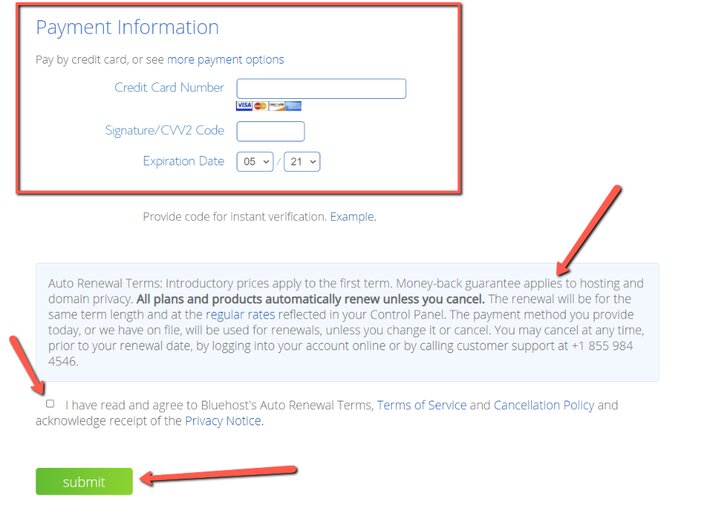
After that, you’ve completed the most difficult part! Congratulations on the launch of your new blog!
Don’t forget to finish setting up your account and installing WordPress on your blog by following the rest of the instructions. You’re now able to move to the next level.
5. Installing a WordPress theme
WordPress templates are referred to as themes in the blogging community.
There are thousands of different themes from which to choose. However, it’s all too tempting to fall victim to “Shiny Object Syndrome” and end up with nothing.
You can change your theme at any time, so instead of worrying about finding the ideal option, go with something that works for you right now.
Your themes, like your brand, will most likely change over time as you find out what performs best in reality.
Let’s take a look at the process of choosing a theme one move at a time.
To begin, go to your WordPress admin and login. Go to yourdomain.com/wp-admin to get to this page.
To log in, you’ll have to enter your login information here.
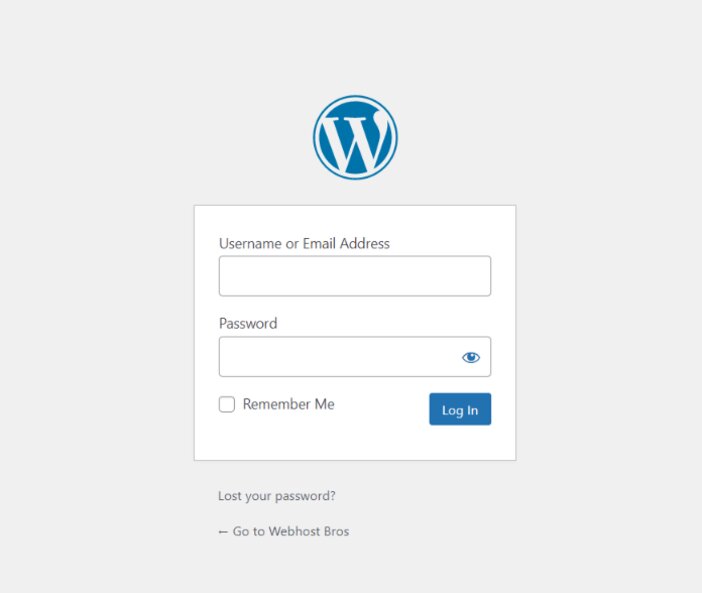
When you’re new to WordPress, the dashboard can seem intimidating at first, with just a little practice, you’ll become proficient in no time.
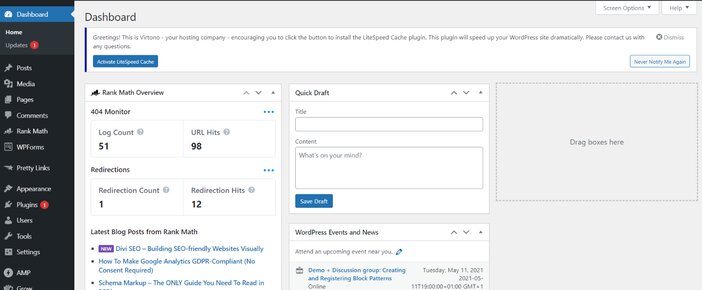
Move over the “Appearance” menu in the sidebar and press “Themes” to install a new theme.
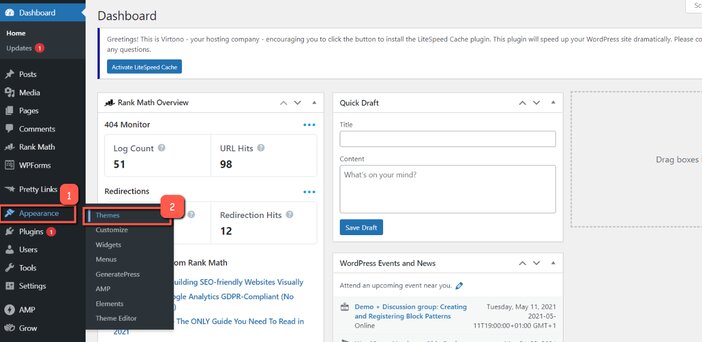
The “Twenty-[Current Year]” themes are included with WordPress.
Instead, we’ll look for brighter themes that will make your eyes sparkle right away. To view thousands of WordPress themes, go to the top of the screen and click the “Add New” button.
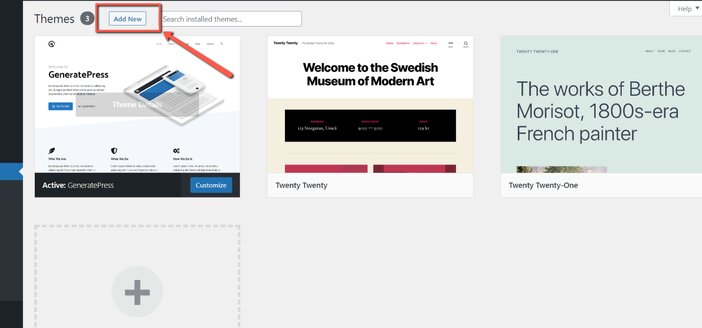
Your preferences can vary from mine. Thankfully, WordPress has a “Feature Filter” that allows you to look for something that matches your preferences.
Simply search for and install your preferred theme.
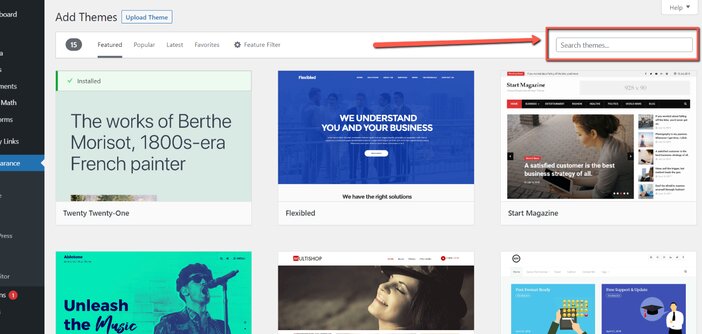
6. Content-Delivery Networks (CDNs)
To ensure that your web pages are delivered quickly, use a framework like W3 Total Cache or WP Super Cache and enable browser caching.
This may be necessary at first. However, as your website grows and your daily traffic reaches thousands of people, this will become increasingly important.
To test stuff before and then after the installation, use Google’s Page Speed Insights.
It’s also critical that you set up a CDN, which will speed up your content’s global distribution.
For example, your page will load quickly in Britain, but what happens if someone in the USA tries to access your content?
Data is replicated through several repositories around the world, allowing for ultra-fast content delivery.
Since 53 percent of mobile site visits leave a page that takes longer than three seconds to load, this is critical for the user’s experience.
W3 Total Cache integrates with Amazon Web Services (AWS) and MaxCDN, two excellent CDN options.
7. Download and install the AMP plugin.
The Accelerated Mobile Pages (AMP) Project is a Google initiative to make a significant portion of their content mobile-friendly.
The AMP specification, which you can learn more about here on Google, uses scaled-back JS and minified CSS code to help reduce a webpage to its simple structural components, resulting in lightning-fast website speeds.
8. Download and install Google Analytics.
Install Google Analytics to keep track of your progress while you build out your website.
This is a perfect way to keep track of your progress when you’re using the URL campaign builder to drop links in social media and other locations so you can figure out where your traffic is coming from.
9. Permalinks should be enabled
Before you get started with WordPress, you should activate permalinks, which will offer you nice SEO-friendly canonical URLs.
Permalinks can be found in your WordPress admin’s settings > permalinks section, where you can choose the post name choice.
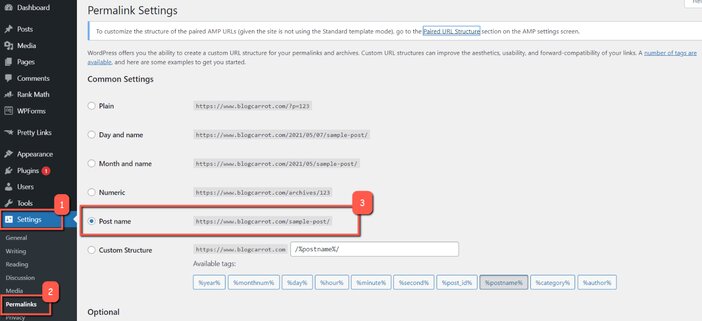
10. Setup Google’s Webmaster Tools
Anyone serious about making money from their blog should use Google’s webmaster software to see what keywords they’re ranking for and any notifications that can affect their ability to rank.
You’ll be able to upload an XML sitemap and log keyword impressions and click-through rates as well.
This is one of the most valuable resources for developing your site or blog by analyzing your efforts on a regular basis.
11. Regularly post useful content
It’s not enough to start a blog, publish seven posts, disappear for a month, return, publish one article, and then vanish.
Nobody is going to take you seriously. Neither the readers nor the search engine is to blame. The importance of consistency cannot be overstated.
Continue to write. As soon as you possibly can. Write at least one post a week, no matter how infrequently. If possible, do it on a more regular basis.
Put yourself in your readers’ shoes. You came across a nice blog today, clicked on it, read the articles, and fell in love with it.
Then you return the next day, nothing new, the day after that, nothing new, the day after that, nothing new, the day after that, nothing new, the week after that, nothing new. Will you return again and again?
So make an effort to be consistent. Consistency is something that Google and other search engines value as well. It denotes that you are a trustworthy source.
You still have no idea which of your posts would break even. The one that will go viral and bring the whole world’s attention to you.
Never give up. Continue to write. The more you publish, the more readers you will attract, and the more authority you will build.
Don’t plan to launch a blog today and have it go viral the next day. Unless you have a lot of budget for this, with lots of money to spend. If you’re starting from scratch, be patient and consistent.
How To Make Money Blogging
Making money from your blog is one of the primary motivations for being a blogger.
Learning how to monetize your blog is important if you want to make money from it. To make money blogging, you must properly monetize your site.
How bloggers make money is a concern that many newcomers have. It is impossible to monetize all blogs in the same way.
As a blogger, you must experiment to determine the best way to monetize your site.
The following are the most common ways to make money blogging.
1. Sponsored blog content
Sponsored content is a tried-and-true income stream for all types of businesses, and it pays off handsomely in the right circumstances.
As a result, it’s a straightforward winner among the various ways to make money blogging.
This technique has been proven to not only work for advertisers but it has also been proven to benefit you.
What is the concept of sponsored content?
It’s when an organization pays you a fee in exchange for you writing an article about them, or on a subject relevant to them, in which their product, service, or brand is heavily promoted as the go-to resource for those who are interested in their service or products.
It’s one of those good deals between a blogger and an advertiser in which you both get something out of it.
When sponsored content is done correctly (rather than as a mere advertisement), it appears authentic, exclusive, and devoid of a high-pressure sales pitch.
If any sponsored post doesn’t start with providing real value to your followers, you’ve already gone off track.
Since you’ve already earned your audience’s confidence, they’ll believe you when you endorse products you trust and believe in.
That’s why, when creating supported content, it is always advised that you remain true to your target audience.
How do I get a sponsored post?
If you have a famous and well-read blog, you might already be receiving sponsorship offers in your inbox.
If that doesn’t describe your current situation, let’s talk about how to get supported content deals.
To begin, identify a few products and companies that are a great match for your niche.
Frequently, you’ll discover that it’s goods or services that you already use. Make a list of at least 10 products you’d be excited to promote and stand behind.
The next step is the most complicated, but it’s not that difficult (I promise).
Go to the websites of your top 10 brands and look for someone who works in marketing or public relations, and use basic blogging software like Hunter or Voila Norbert to find their email address.
Remember that many organizations that accept sponsorships prominently display a sponsorship email address on their contact pages.
Finally, give them a cold email with your proposal to collaborate on sponsored content for your readers, emphasizing why they should buy into your idea and take up the deal.
2. Sell online courses
Do you have a skill set that you can pass on to others? Do your readers look up to you for advice on a specific topic?
Create an online course to monetize your knowledge and you’ll be well on your way to making money.
What’s the best part? Recording a series of short tutorial videos that show your blog followers how to do anything meaningful based on your own blogging skills, insights, and achievements can be as simple as creating an online course.
Some individuals would happily pay to profit from your knowledge and boost their learning curves if you’ve succeeded at anything.
Major online learning platforms like Skillshare, Udemy, and CreativeLive all provide a wide selection of courses ranging in length from 30 minutes to 30 hours or more, with the lengthy courses attracting higher prices due to their in-depth nature.
On the other hand, you can make an online course as time-consuming as you want it to be.
As you figure out how to make money blogging with courses online, my recommendation is to record a short-form course (just under 60 minutes of video content) on a very particular niche subject that can be taught without too much guidance.
3. Become a freelance blogger
If you already love blogging, you can use it as large advertising to draw clients who are willing to pay you to blog.
This is really a pretty good way to earn money. It’s also fairly common in some blogging niches.
Kevin Wood, for example, blogs for web hosting giant HostGator while still maintaining a personal blog named Wooden Writing, which he uses to find freelance blogging clients:
What’s the best way to go about it? Like Kelvin, make a Hire Me website. Then, if anyone likes what you’ve written, they know how to reach you.

But, what do you need to begin your blogging career? This detailed step-by-step guide on how to build a blog on your own comes highly recommended.
4. Create a membership site
Launching a full membership platform is the final form of eBooks and online courses.
Your readers pay a monthly fee to gain access to a full collection of knowledge on a subscription platform.
Check out Digital Marketer’s “Lab” site for an example of this in practice.
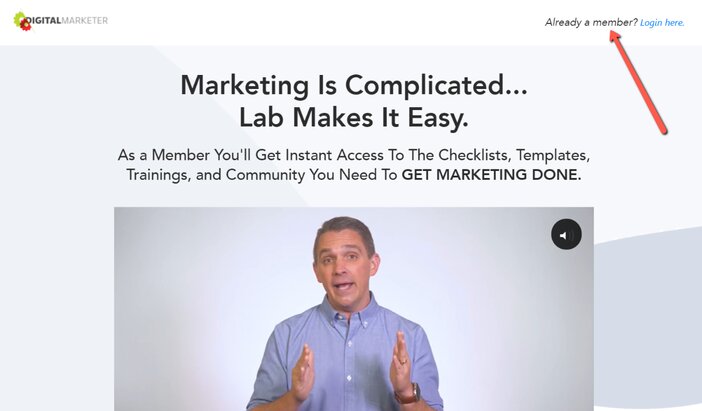
Readers will have to pay a monthly fee to access premium content through Digital Marketer Lab:
5. Charge people to read your posts
This seems like a pretty far-fetched way to make money with a blog, doesn’t it? Do people have to pay to read all of your posts?! Isn’t it true that no one will ever pay?
It all depends on your market. This is not a form I would suggest for most websites. However, several bloggers have had success with this strategy.
A limited number of articles are available for free to readers. However, they will have to pay to continue reading after that.
Not for all, once again. It could be a viable option if you have long-form content that people enjoy reading.
6. Affiliate marketing
Affiliate marketing is when you use unique tracking links to suggest a product or service to your audience, and you get paid a referral fee every time anyone buys after clicking your link.
When you introduce a friend to a multi-level marketing program, this is an example of affiliate marketing in action. As a reward, they usually give you a percentage of your friend’s enrolment fee.
Many products and services on the internet have partner programs that you can enter in the same way. For every sector, there are affiliate programs (niche).
If you want to get started with affiliate marketing, consider the services you currently use and think about what your readers may be interested in.
You will then check if they have an affiliate program that you can join.
You can choose from a large number of items to promote from the affiliate networks below:
After you’ve decided which service or product to endorse, you can track your affiliate links with a WordPress plugin like PrettyLinks or ThirstyAffiliate.
These plugins let you easily insert links into posts, build branded links, auto-replace keywords in links, and even track how well each connection performs on your blog.
Since you can sell a wide range of services, affiliate marketing is the simplest way to make money.
Almost every well-known retailer, such as Best Buy, Walmart, Amazon, and others, has an affiliate program.
7. Get paid to write reviews
You can make money writing paid reviews on your blog in the same way as you can with sponsored content.
As stated previously, this is a slightly distinct monetization approach from a review platform with affiliate links.
Instead, you should get relevant items in your niche, try them out for free, and you can even get paid to write reviews.
This can be done in a similar way to having sponsored posts.
You’ll want to write product reviews for products that are related to your niche and that your target audience will be interested in.
You should contact businesses on your own to inquire about paid reviews.
Websites like PayPerPost also can help you interact with companies that may be interested.
8. Flipping websites
You are well ahead of a lot of people if you know how to build a WordPress website.
Entrepreneurs often opt to purchase pre-existing websites that they can use for their own companies.
If you can create a WordPress blog and get it some traction, you can market it and profit from your efforts.
This necessitates the understanding of the different types of websites in demand, as well as how to price and sell them.
Flippa, for example, is a website that acts as an auction marketplace and a broker for selling websites.
9. Create a WordPress job board
Another alternative is to create a for-profit job board.
Companies will pay you to request a listing if they wish to advertise an open spot to your audience.
It’s easier to create a competitive job board if you focus on a particular niche.
With minimal competition, you will become the go-to place for anybody trying to get a job in that industry.
This is ideal for well-established blogs in a specific niche.
ProBlogger, for example, is well-known for its job board for professional bloggers.
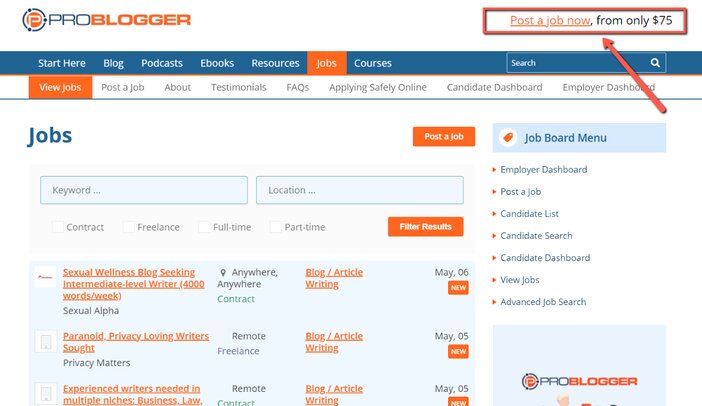
Companies searching for freelance bloggers pay ProBlogger money just to be able to post a job ad on the site.
10. Sell ebooks
When it comes to making digital content, ebooks are an easy option.
They’re not difficult to write and make.
If you’re already blogging for a while, you can compile a collection of your older posts and convert them into book chapters.
After you’re done writing your book, you can use a tool like Canva to build a cover and a PDF of your ebook.
With a plugin, marketing digital products on WordPress is easy. We recommend Easy Digital Downloads for digital downloads.
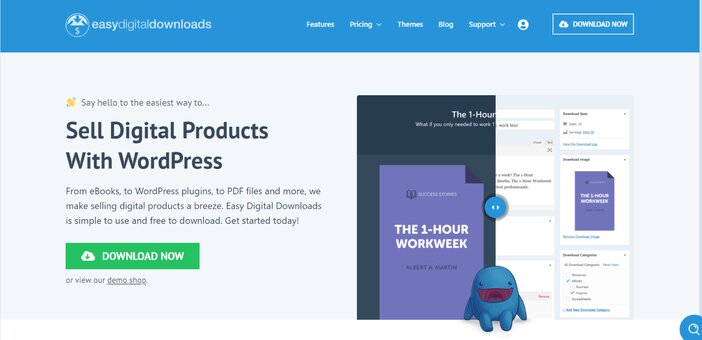
It’s easy to use and bears all of the features you’ll need to set up your online shop.
11. Paid webinar
Webinars are an excellent way to expand your audience, share your knowledge, and expand your company.
Did you know, however, that they can also be used to make money online?
Webinars are similar to online courses in that they are delivered live and often involve a question and answer session.
Hosting a paid webinar is simple with WordPress. It’s critical for your webinar’s success, whether you’re using your website to host the webinar or simply to promote it and register participants.
12. Consulting business
Consulting is another avenue to make money through your blog while still sharing your knowledge.
As a consultant, rather than providing your services, you provide advice and strategy to help their clients become more successful.
There is no initial investment like there is with freelancing. On your current site, you will begin offering consulting services.
All you have to do is build a page with a form for users to fill out to request more details.
WPForms is a WordPress plugin that makes it simple to build a professional, mobile-friendly form.
13. Become a coach
If you don’t think “consultant” is the best title for you, consider being a coach instead.
A life coach will help you set goals and improve your life by providing advice, guidance, and accountability. Other types of coaching exist, such as blogging coaches, publishing coaches, and so on.
With coaching sessions, you can offer one-on-one assistance to your audience in the field you specialize in.
You should set up a registration form so readers can arrange coaching sessions right from your WordPress blog to save time and make it easier for your clients.
14. Sell WordPress themes
You could start selling your own WordPress themes if you enjoy web design and production.
This necessitates both artistic and technological abilities. You must be able to produce a professional-looking template as well as code it for WordPress.
Matthew Woodward, a six-figure blogger, created the Authority WordPress theme, which is available for $59 on Mythemeshop.
15. Launch a job marketplace website
A job marketplace, unlike a traditional job board, helps you to profit from each job posting.
A great example of online job marketplace websites is possibly Fiverr and UpWork.
You can use your job marketplace to promote it as a micro-job site for people who work in the same industry as your blog.
You may choose a very specific niche to keep your platform more competitive.
This will make it easier for you to locate consumers and professionals who are unable to use broad channels due to excessive irrelevant rivalry.
You may charge a small fee for work postings or the completion of a job.
In the future, more efficient job completion would get you more clients and freelancers.
16. Google AdSense ads
Making money blogging via this means is on a separate category of its own because Google AdSense is one of the most common and straightforward ways to start monetizing your blog.
I’m betting you’re familiar with the look of AdSense ads. If you don’t know what this looks like, here’s an example:

To get these ads on your blog, simply sign up for AdSense and paste the ad code into your HTML.
Google will then show ads that are important to your content and visitors.
You’ll be compensated if someone clicks on your ad (referred to as cost per click) or simply views it (known as cost per impression).
17. Sell ads directly to advertisers
AdSense as well as other display ad channels find ads for you, allowing you to explore how to make money blogging without having to do any work.
However, they do take a share of what advertisers pay you in exchange.
So cutting out the middleman is one way to possibly make more money and have more power over the advertising on your web. To put in simple terms, sell advertisements directly to advertisers.
The easiest way to draw these opportunities, just like sponsored posts, is to build an Advertise page on your site that lists information about your traffic (including Google Analytics screenshots).
However, you could try reaching out to companies in your niche on your own initiative.
When you do get any advertising, there are several WordPress plugins that will assist you in managing them. Here are a few examples:
18. Accept donations
Simply asking for money from your WordPress blog is one way to make money.
There are a few different ways to start accepting donations.
You may have a PayPal or Stripe donation button on your website.
You may also use WPForms to build a donation form on your WordPress site for a more professional design and advanced features including email marketing integration.
Donations are at the bottom of the list because they are ineffective and depend on the kindness of your readers.
It’s typically more profitable to provide them something in exchange.
19. Sell your blog and cash out
Finally, we’ve arrived at the nuclear choice for making money blogging: which is to sell your blog.
If you’ve reached the point where you either want to cash out or believe you will in the future, selling your blog allows you to receive a large lump sum for all of your hard work.
What kind of revenue would you expect from your blog?
That is entirely dependent on the age, traffic, sales, and quality of the site.
However, you can expect to earn anywhere from 20 to 30 times the amount your site generates per month.
In 2016, The Wirecutter, a famous review website, was sold to the New York Times for a whopping $30 million.
When it comes to selling your blog, you have two options: try to find buyers on your own or use a third-party marketplace like:
Frequently Asked Questions
1. How do new bloggers make money?
It can take some time to start generating any income if you’re just starting out.
New bloggers should provide consulting and coaching services to gain a higher income in return for their time in the early stages.
Since traffic levels are poor at first, it sounds reasonable to convert those visitors into buyers with a higher-priced bid.
Bloggers can add affiliate links, digital products, and advertising to their blogs until they have a steady stream of consulting income and increased traffic.
2. Do I need an LLC for my blog?
No.
Running a blog does not necessitate the formation of a limited liability company (LLC).
You will start as a sole proprietor and deduct your earnings from your personal income taxes.
There are tax benefits to forming an LLC or S Corp once you start making a significant amount of money.
3. Who is the richest blogger?
The Huffington Post’s Arianna Huffington is the world’s wealthiest blogger.
Her news website, which she created in 2005, now generates over $15 million every month.
Michael Arrington, the editor of TechCrunch, is another wealthy writer.
His technology blog earns him about $800,000 a month.
4. Is it worth blogging in 2021?
Yes.
Despite reports that no one wants to read the long posts or that all content will be delivered via video, blogging is still a viable and successful medium for creating content and growing an online company.
In 2021, blogging is still applicable, but in different ways.
Content marketing is all the rage these days, and how numerous pieces of content distributed through various platforms will promote your own website.
It’s no longer all about blog posts: it’s about a variety of content items.
5. What type of blogs make more money?
Although starting a blog is an excellent way to earn money online, most newcomers are unsure of what sort of blog to start. Most newbies have probably wondered what kinds of blogs are the most common.
If this describes you, you’ve come to the right spot! We’ve compiled a list of the ten most profitable blog styles.
- Finance Blog
- Education blog
- Fashion Blog
- Lifestyle Blog
- Food Blog
- Mattress blog
- Gadgets blog
- Personal finance
6. How do I start a blog with no money?
The steps below can assist you if you want to start a blog in any niche with no technical expertise and almost no income.
- Step 1 – Find your passion and start writing possible content ideas
- Step 2 – Discover your tribe
- Step 3 – Develop a memorable brand
- Step 4 – Conduct keyword research
- Step 5 – Set up a Medium blog
- Step 6 – Research your keyword
- Step 6 – Write your article
- Step 7 – Posting your content on to your Medium blog
- Step 8 – Be consistent
7. Is blogging dead in 2021?
No.
Blogging isn’t going anywhere in 2021.
In reality, it is unlikely to die in the next decade.
However, how people consume blog posts today is vastly different from how they were consumed 10 years ago.
If bloggers want to maintain consistent performance with their blogs, they must adapt and develop new business models.
8. Why do blogs fail?
Bloggers struggle for a variety of reasons, one of which is a lack of entertaining, high-quality material.
With so much content being created, great content is a must-have if you want to stay in the game.
Again, most bloggers enter the game with the expectation of making money in a matter of weeks, oblivious to the fact that checks take time to arrive.
9. Can I start blogging with my phone?
Yes.
You can use the Blogger mobile app to create, edit, save, and update your blog posts.
The app supports Android 5.0 and higher.
With the app, you can write posts from anywhere and at any time.
However, we do suggest that if you are serious about blogging, you use a laptop or tablet.
10. What is keywords in blogging?
A keyword is a key phrase or word that describes the content of a blog article or website.
Keywords are terms or phrases that define the topic of your content.
This information is used by Google to decide which content is important to a given search query and how your website should rank in searches for that keyword.
That is what determines a website’s search ranking.
11. How many keywords should I use for SEO?
At the very least, one.
Some webpage may have a single focus that responds to a single question.
Even if they’re only similar variants, it’s far more probable that you’ll want to target two to four keywords per page.
More than four is an overkill; after all, each webpage has just one title tag and meta summary.
12. Can you pay Google to rank higher?
No.
Since Google is key to maintaining their search content useful and trustworthy, search listings are free, and no one can pay for a higher ranking.
Despite some claims and misconceptions, running a Google Advertising campaign does not help your SEO rankings.
Paid advertisements have no impact on SERP rankings because they are handled organically.
PPC advertising, on the other hand, will help you reach a broader audience online.
13. How much money can I make from blogging?
It all comes down to how much work you put in and how much time you’re able to devote.
To be frank, several new bloggers quickly lose interest and give up.
The amount of money you make can be determined by the amount of traffic you get, the monetization strategies you use, and the amount of work you put in.
Many popular bloggers earn six-figure or even seven-figure sums of money.
Conclusion
Cha-ching!
And there you go! 19 viable ways for how to make money blogging.
While not all of them would apply to your case, you should feel free to combine them to build a diversified revenue stream.
If you depend solely on one source of income, you place yourself at risk if that source of income fails.
However, if you sell affiliate goods, have AdSense ads, run an e-course, and have a podcast both at the same time, it would be difficult to lose all of your revenue in one day!
If you want to make money blogging, we suggest signing up with BlueHost, which will give you a free domain for the first year.
WebHost Bros is an online resource that helps you to find the best web host that is best for you. Here is our list of the best hosting providers in the market.
